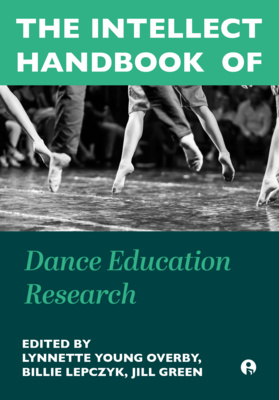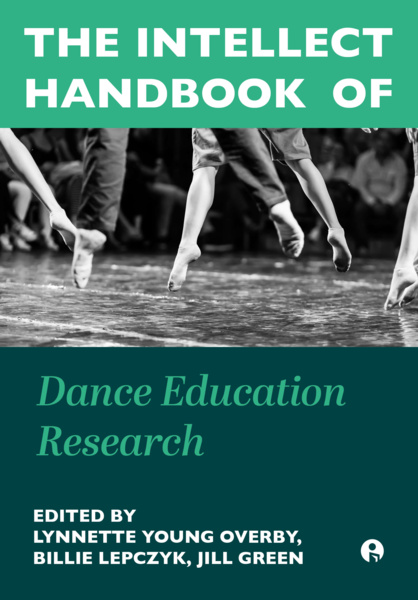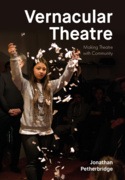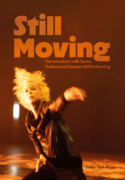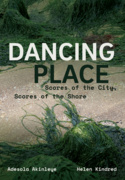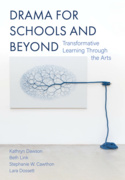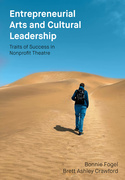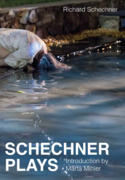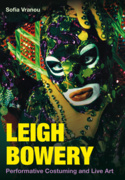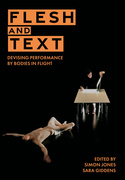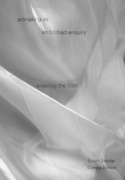The Intellect Handbook of Dance Education Research (Book)
A review of dance education research methodologies with examples and exemplars from the field. The research methodologies include qualitative, quantitative, and mixed methods. Exemplars include investigations from pedagogy, history and cultured, community engagement, social justice and international dance education research.
Edition
A review of dance education research methodologies with examples and exemplars from the field and an important resource for dance students, professionals, and advocates.
The editors recognized the need for a book of this type – one that would not only provide examples of a variety of dance education research projects, but also present a broad look at methodologies. In addition, the book would not only focus on Dance Education research in the U.S, but more broadly with examples of dance research from several different countries. The curated book includes the voices of both seasoned professionals and newer scholars in the field, with examples of dance research from a number of different countries. The contributions represent several countries including Korea, South Africa, United States of America, Jamaica, India, United Kingdom, Brazil, and Slovenia, underscore the global relevance and significance of research in dance education.
This book is divided into 5 parts. The first part focuses on dance education research and methodologies and is divided into three sections. With an introduction by Jill Green, the chapters that follow provide an overview of research types including the more traditional, qualitative, quantitative and mixed, and other methods such as portraiture and a/r/tography.
Part II, introduced by Lynnette Young Overby, includes examples of dance education research that incorporate qualitative, quantitative, and/or mixed methods. Three sections covering dance education research applications in the areas of history and culture, dance teaching and choreography, and community based research follow.
Part III of the Handbook of Dance Education Research provides insight into dance education that takes place in several countries. This part is introduced by Peter Cook, Associate Deputy Chancellor, Southern Cross University, Australia. The collection of chapters within this part of the Handbook of Dance Education Research provides snapshots of research practices from contrasting international areas, and with a variety of approaches and paradigms.
The final Part IV includes chapters focused on Social Justice dance education practice and research. This part is introduced by Alfdaniel Mivule Basibye Mabingo, Makerere University, Uganda. These chapters push the boundaries of dance education research to promote meaning and social change. They provide substantive examples of the impact dance education research can have in response to social and cultural issues.
This book will be a key resource for university students, professors, practitioners and policy makers in organizations and in school systems. It will inspire future dance education researchers to conduct research that is collaborative, impactful, inclusive and diverse– research that will solidify the place of dance as an integral part of each person’s education.
Lynnette Young Overby, Ph.D. sits on the National Council for the Humanities and was a Professor of Theatre and Dance at the University of Delaware. She currently serves as a Research Associate with the Arnhold Institute for Dance Education, Research, Policy & Leadership, Teachers College, Columbia University.
Dr. Billie Lepczyk , Professor of Dance and member of the Academy of Teaching Excellence at Virginia Tech, is a Teacher College Fellow of Columbia University and holds Dance Notation Bureau Certifications as Professional Notator, Movement Analyst and Labanotation Teacher. Her research and publications concern movement analysis and dance style and her forthcoming book outlines the creative dance curriculum she developed where floorplans serve as a composition tool in dance-making.
Jill Green, Ph.D., taught dance and somatics for over forty years. She served the School of Dance at UNCG as professor, researcher, and Director of Graduate Studies, and Interim Director, and received a number of teaching and researcher awards.
Dedication
List of Illustrations
Foreword
Acknowledgements
Contributor Biographical Sketches
1. Introduction to The Handbook of Dance Education Research
Lynnette Young Overby, Billie Lepczyk, and Jill Green
Part I: Dance Education Research Methodologies and Theories
2. Introduction to Part I
Jill Green
Section I: Qualitative Research
3. Qualitative Research as Creative and Critical Bricolage
Matthew Henley
4. Qualitative Research Methods in Interdisciplinary Arts Projects
Ali Duffy
5. The Privilege of Portraiture Methodology
Susan Pope
6. A/r/tography as Research Methodology: Explorations and Impact on Understanding
Choreographic Practice
Peter Cook
7. Dance Education Research with Oral History: Practice and Potential
Caroline Sutton Clark
Section II: Quantitative Research
8. Quantitative Dance Education Research: Issues, Details and Procedures to Consider
Sandra Minton
9. Quantitative Research with a Focus on Dance Science
M. Virginia Wilmerding and Donna H. Krasnow
Section III: Mixed Methods Research
10. When Qualitative Narratives and Quantitative Numbers Work Together:
Making Sense of Mixed Methods Design in Dance Education Research
Jenny McNamara and Doug Risner
11. Methods for Researching Group Activity in Dance and Dance Education
Miriam Giguere
12. Tap Dance Research: An interdisciplinary approach to mixed methods research with
collaboration in the areas of dance, early childhood development, kinesiology, family
studies, and nutrition
Julie Pentz
Part II: Exemplars of Dance Education Research
13. Introduction to Part II
Lynnette Overby
Section I: Dance Education History and Culture
14. Dance Education Literature and Research Descriptive Index: A Body of
Knowledge In and About Dance Education
Rima Faber
15. Moving Between Competitive and College Dance: Students’ Experiences Bridging
the Gaps
Karen Schupp
16. Shaped by American Pageantry Movement in Forceful and Forgotten Ways, Dance
Education, History and Culture 1911-1924
Naima Prevots
Section II: Dance Pedagogy and Choreography
17. Why Focus on Children and Dance?
Judith Lynne Hanna
18. Research Your Pedagogy Using Two Methods
Teresa Heiland and Kaitlyn Whitaker
19. Pathways to pedagogical diversity: dance and disability in education
Sara Whately
20. Assessment as a Pedagogical Tool and Research Method for Programmatic
Evaluation
Dale Schmid
21. Unraveling Embodied Terrains: Scrutinizing Choreographic Process
Nadra Assaf and Heather Harrington
22. Bubble Dance: Visualizing Microscopic Acoustic Phenomena
Billie Lepczyk
Section III: Community Engaged Research
23. Youth Participatory Action Research: Generating Knowledge Together for Social
Change
Rachel Swenson
24. Developing dance students as active citizens through civic and community
engagement
Joy Guarino and Enya-Kalia Jordan
25. Building a Dance Community in Lebanon: An Introspection on the Journey to the
International Dance Day Festival in Lebanon (IDDFL)
Nadra Assaf and Rain Ross
26. Planning Relevant Dance Interventions Through Logic Modelling
Lucie Beaudry and Sylvie Fortin
Part III: International Dance Education Research
27. Introduction to Part III
Peter Cook
28. Dance Education in India
Aadya Kaktikar
29. Analysis of Research Trends in Dance Education in Korea:
Focusing on Dance Research Journal of Korea
Young Moon
30. The Importance of Dance Integration for the Educational Process in Kindergartens,
Primary Schools and Secondary Schools in Slovenia
Vesna Gersak
31. Dancing Videoletters between a Mehin (indigenous krahô)
and a Supposed Cupē (non-indigenous): An expanded notion of embodiment
Alba Pedreira Vieira and Francisco Hyjnõ Krahô
32. A snapshot of Dance Education Research in South Africa
Gerard M Samuel
33. Dance AND…Dance Education Research in the USA
Susan Koff
34. Addressing ‘value’ concerns with advocacy research: Dance education in the UK
Kathryn Stamp
35. Dancing to a Different Beat: The Distinctive Evolution of Dance Education
Research in Jamaica and Its Resonance Throughout the Caribbean
Nicholeen DeGrasse-Johnson, and Christopher A. Walker
Part IV: Dance Education Social Justice Research and Practice
36. Introduction to Part IV
Alfdaniels Mabingo
37. A Qualitative Methodology for Social Justice in Dance Education and Somatic
Research
Jill Green
38. Plática, Testimonio, y Convivencia: Centering Chicana/Latina Feminist Pedagogies
and Research Methodologies in Dance Education
Kiri Avelar and Franchesca Marisol Cabrera
39. Using Hip Hop Pedagogy to Create Equitable Dance Spaces
Ariyan Johnson
40. BEYOND CONSUMPTION: The Power of Dance to Transform
Elana Denise Anderson Anderson
41. Disrupting and Reimagining the Archives:
Interdisciplinary and Chicana/Latina Feminist Interventions as Decolonial Praxis
Kiri Avelar and Michaela Summers
Reflection and Next Steps
42. Lynnette Young Overby
Appendix: Dance Education Resources
Emily Uhler and Lynnette Young Overby
Index

